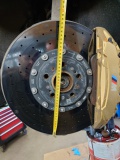Online
Pašreiz BMWPower skatās 240 viesi un 12 reģistrēti lietotāji.
|
Tēma: Katastrofa Japānā
| Autors | Ziņojums |
|---|
mc  | |  Kopš: 11. Apr 2009
No: Rīga
Ziņojumi: 48015
Braucu ar: lēnu žurciņu
| nu labi labakajaa gadiijumaa dzeseeshanas probleemas atrisinaasies, ierastaa gadijumaa uzies gaisaa, bet ne reaktors. kaads ir sliktais scenaarijs, kaads var pamatoti uzmodeleet 
-----------------
|  Offline Offline | | |
| Ragnos | |  Kopš: 03. Jul 2008
No: Rīga
Ziņojumi: 483
Braucu ar: LC120, C1 mocikletu un C4
| Papildinoša, svaiga info. Pa minūtēm:
http://en.wikipedia.org/wiki/Fukushima_I_Nuclear_Power_Plant |  Offline Offline | | |
| Ugunsdzesejs | |  Kopš: 16. Dec 2008
Ziņojumi: 5327
Braucu ar:
| ja būs pavisam slikti, tad kodoldegviela aizies augsnē un tas atstās iespaidu uz planētas ekosistēmu, kā arī dazādi radioaktīvi materiāli nosēdīsies uz augsnse vai arī ar mākoņu un lietus palīdzību nonāks citur, jonizētas putekļu daļiņas izklīdīs pa pus pasauli.
kaut kā tā. globāla saindēšanās(ko, protams, mēģina pasniegt kā pilnīgi nereālu lietu  ) ) |  Offline Offline | | |
| RAPID951 | | Kopš: 09. Dec 2010
Ziņojumi: 42
Braucu ar:
| Worst that could happen?
1 Uncontrolled nuclear explosion. Probability = less than 1 in a billion, billion. There is no initiator for the reaction to go super-critical which is needed for a Hiroshima type of explosion. It just wouldn't ever happen unless there was a complete lack of moderator, and there was a primary ignition source all around the chamber at the exact same time(shaped charge) that would compress the U235 enough to make it explode. Very far fetched.
2 Uncontrolled fission boil off. Probability = very very low. Containing hot, radioactive U235 is hard to do. Once it changes state from a solid pellet to a liquid and starts to flow, everything around it - pipes, tubes, valves, seals, etc has already come apart. If it didn't and the U235 was able to be contained in a vessel that allowed the Uranium to pool, you could have a Uranium boil off. The Uranium changes state from a liquid to a gas, and boils into the air. This is a very bad thing, almost as bad as a bomb, but the fission byproducts are not scattered as badly as with a bomb. As with any boil off, they condense, and come back to earth(Uranium is very heavy, even as a gas), and many of the constituents of the boil off are also very heavy and stay close to the ground. Again, still bad, but not too bad.
3 China Syndrome. Probability = Dependent on what it's sitting on. Uranium will etch right through concrete and steel if it gets hot enough. Both in heat and radioactivity. Once it gets through the containment housing, it's in the bedrock below, which is what all reactors are built on. Nature will take it's course, and the Uranium could go down quite a way. We really don't know because we've never had a true China Syndrome happen, so it's all pretty sketchy. I doubt it would go down very far, but it would spread out a way. Hard to collect, hard to clean.
4 Chemical explosion. Probability = pretty high, depending on how far they let it go. We've already had one H2 bubble blow, and the other reactors are surely close to the same. Venting may help but at this point, venting and blowing are two side of the same bad coin. It puts a bunch of radioactive junk in the air, but it usually doesn't go very far, or last very long. The Chernobyl explosion blew the casing apart, and they had at least a partial Uranium boil off which made the release of the radioactive gases far higher than is normal. It was the worst case scenario of the chemical explosion that could happen, but at least it wasn't a fissile reaction, so they were lucky there.
5 Chemical/radiological spill. Probability = almost certain in the event of a SCRAM. Even small leaks are tracked, and it's just about impossible to SCRAM without a small release of some radioactive material. Stuff happens. |  Offline Offline | | |
| artis83 | |  Kopš: 24. Jul 2010
No: Liepāja
Ziņojumi: 6255
Braucu ar: audi
| nu pasaule jau taa ir piesaarnjota, ka lieki s..i augsnee bijusji nebijusji manupraat.
protams visbiistamakais scenaarijs buutu ja japaana paliek par neapdziivotu vietu..tas gan taa apokaliptiski. re pat zjiriks sola izmitinaat visus japaanjus sibiirijaa(reta reize kad onkam normaalas idejas)
vairaak uztrauc, ka no zemestriices atnaak atrauga liidz tai pasjai latvijai..un mums jau apkaart arii ir savas atomstacijas, kuras nav uz simtdalju tik drosjas kaa japaanaa:
nu taa, mans sliktakas scenaarijs |  Offline Offline | | |
| Demagogs | |  Kopš: 02. Apr 2008
No: Rīga
Ziņojumi: 1193
Braucu ar:
|
14 Mar 2011, 13:55:02 Usins rakstīja:
atomstprādzieni 1945-1998
tā interesanta animēta karte
Psc, jāpārtrauc dzert, noskatījos to video, un nepamet doma - wtf, kur Krievija??! Tikai pēc stundas manas palikušās šūnas manās smadzenēs sagremoja, ka viena ir Ķīna un otra USSR, a es domāju ka Ķīna un Z-koreja - tie karodziņi. |  Offline Offline | | |
Norchx  | |  Kopš: 19. Oct 2008
No: Rīga
Ziņojumi: 11373
Braucu ar:
| 1300: Atsuko in Tokyo writes: "I've just heard about meltdown alert. I wish I could stay home tomorrow, but I have to go to work. I work for a medical device company that is used for chronic care. We have responsibility to deliver products to patients even in such situation, especially those in disaster area. My office is in central business district, but today we worked in limited light to conserve energy, threatened by repeated aftershocks. We are enduring enormous difficulties that we haven't experienced in recent history. We Japanese people appreciate concern and well wishes from around the world much more than you could possibly imagine. Many thanks.." |  Offline Offline | | |
| Onka | |  Kopš: 10. Feb 2005
No: Rīga
Ziņojumi: 475
Braucu ar: 325 01’
| Citāts no viena raksta:
Monitoring of the Daiichi plant has detected several signs that at least a partial meltdown may be occurring, according to Japan's nuclear safety agency, including high levels of hydrogen inside reactor buildings and radioactive cesium detected outside the plant. This could be caused by the melting of fuel rods inside the reactor, experts said.[ Šo ziņu laboja Onka, 14 Mar 2011, 15:19:54 ] |  Offline Offline | | |
|
|
| Ugunsdzesejs | |  Kopš: 16. Dec 2008
Ziņojumi: 5327
Braucu ar:
| ja aizies zemē, tad būs plaši okeāna un zemes piesārņojumi, bet protams, nekas tāds, kas jau nebūtu pieredzēts |  Offline Offline | | |
Norchx  | |  Kopš: 19. Oct 2008
No: Rīga
Ziņojumi: 11373
Braucu ar:
| Cerēsim, ka viss beigsies salīdzinoši droši, jo katru stundu viss pagaidām iet arvien lielākā dirsā. |  Offline Offline | | |
| Ugunsdzesejs | |  Kopš: 16. Dec 2008
Ziņojumi: 5327
Braucu ar:
| kādā dirsā, tv kaste saka, ka viss ir gerai un būs  tam jātic tam jātic  |  Offline Offline | | |
Norchx  | |  Kopš: 19. Oct 2008
No: Rīga
Ziņojumi: 11373
Braucu ar:
| 20 microSievert/hour at 11:44AM
Wikipedia
Japan’s Asahi Shimbum newspaper reported early Saturday that radiation levels per hour in the area near the front entrance of the No. 1 Fukushima plant reached 0.59 micro Sievert, which is eight times the normal levels. The central control room of the reactor recorded radiation levels 1,000 times the normal level, which would be approximately 70 microsieverts per hour, or 7 millirems, according to calculations by msnbc.com.
NBC |  Offline Offline | | |
| Ugunsdzesejs | |  Kopš: 16. Dec 2008
Ziņojumi: 5327
Braucu ar:
| tie līmeņi ir niecīgi, godīgi sakot. nav jau protams nekas patīkams, bet nav arī nekas augsts |  Offline Offline | | |
| 7788 | |  Kopš: 21. Jan 2005
Ziņojumi: 2520
Braucu ar:
| Ka tik sacelt lielāku ažiotāžu, lielākai daļai no žurnālistiņu nav ne jausmas par ko viņi raksta un ar Černobiļu ir nekorekti salīdzināt, jo tur bija cita tipa dzesēšana reaktoram  Dzesēšana pazūd, ūdens iztvaiko, netronu pavairošanās ķēde pārtaukta utt. Dzesēšana pazūd, ūdens iztvaiko, netronu pavairošanās ķēde pārtaukta utt. 
Palasiet tak literatūru, lai vismaz ir skaidrs par ko spamojat  [ Šo ziņu laboja 7788, 14 Mar 2011, 15:37:50 ] |  Offline Offline | | |
| Onka | |  Kopš: 10. Feb 2005
No: Rīga
Ziņojumi: 475
Braucu ar: 325 01’
| Atgādiniet kas notiek šobrīd ar Černobiļas degvielu???
Saprotu ka daļa sprādzienā tika izmētāta apkārtnē.
Bet kas ar pārējo?? Aizgāja augsnē vai nē?? |  Offline Offline | | |
| Ugunsdzesejs | |  Kopš: 16. Dec 2008
Ziņojumi: 5327
Braucu ar:
| neviens nezin, tur tas joks 
kad laida zondes un gāja cilvēki iekšā kamerā, konstatēja, ka tur tās degvielas vairs nav
viens variants ir tāds, ka tiešā nozīmē izkūpēja gaisā
otrs variants tāds, ka augsnē |  Offline Offline | | |
|
|
| Onka | |  Kopš: 10. Feb 2005
No: Rīga
Ziņojumi: 475
Braucu ar: 325 01’
| Skatos ka Fukušimā taisās ventilēt arī 2. reaktoru. Kurš uzminēs, sprāgs vai nē??? |  Offline Offline | | |
| Ugunsdzesejs | |  Kopš: 16. Dec 2008
Ziņojumi: 5327
Braucu ar:
| ja uzsprāgs tur(otrajā vai trešajā reaktorā) uzkrājušas gāzes, vēlos, lai powers pasludina mani par Misters Atombumba salidojumā. |  Offline Offline | | |
| Onka | |  Kopš: 10. Feb 2005
No: Rīga
Ziņojumi: 475
Braucu ar: 325 01’
| 1. un 3. taču jau uzsprāga, tagad taisās nolaist spiedienu 2. |  Offline Offline | | |
| jurxx | |  Kopš: 11. Oct 2007
No: Jelgava
Ziņojumi: 4392
Braucu ar:
| Ako tu domāji TV tak arī lobē savas intreses... 
Japānas amatpersonas, kā visās valstīs visu stādis no viedokļa nothing special 
bet citi eksperti teiks ka pakaļā...
Japāņiem tur tagad papildus ekoloģiskajam haosam ir pievienojies ekonomiskais (par ko vakar taisni minēju)  produkti trukst piegādes apstājas investori samīžas, valdība veic piķa injekcijas, lielie ražotāji aptur rūpnīcas so on so on.. produkti trukst piegādes apstājas investori samīžas, valdība veic piķa injekcijas, lielie ražotāji aptur rūpnīcas so on so on..
Ak jā nafta šon noslīdējusi par aptuveni 2% un te visādi eksperti runā kad kritīs vēl... jāskatas tālāk kā viss atrisināsies, jo pat reitingu aģentūru cilvēki rakstos raksta, kad nav īsti vēl skaidrības cik lielu efektu tas viss atstās uz Japānu... |  Offline Offline | | |
|
Moderatori: 968-jk, AV, AiwaShuraLLP, GirtzB, Lafter, MarC, PERFS, RVR, SteelRat, VLD, linda, mrc, noisex, smudo, xjs_4
|